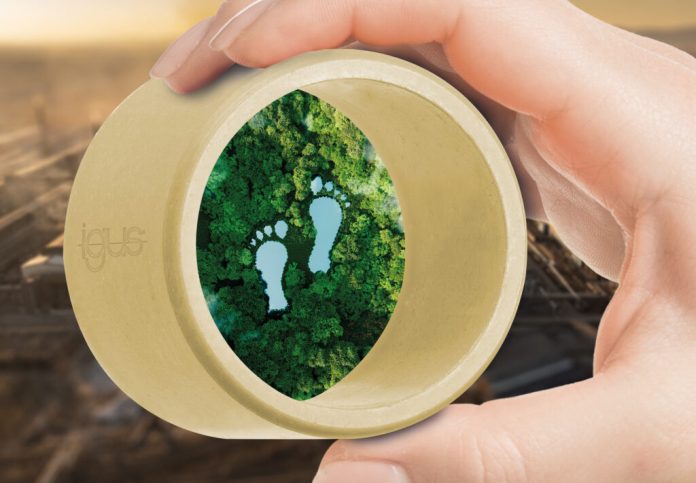Design World
| September 28, 2022
How much CO2 is released into the atmosphere as a result of plastic bearings production? For the first time, igus, the motion plastics specialist, is publishing precise CO2 footprints for many of its self-lubricating, maintenance-free iglide polymer plain bearings. Users can use these values as Scope 3 emissions in CO2 accounting for climate-neutral products.
In times of climate change, manufacturers and their customers are increasingly faced with the question of how sustainable the products they produce and use are. One focus is on CO2 emissions. Companies account for, reduce, and offset so-called Scope 1 emissions (those arising locally), such as those from operating delivery vans and machinery. The same applies to Scope 2 emissions (indirect emissions from purchased energy) and Scope 3 emissions (those generated by suppliers).
“Accounting across company boundaries is often a real challenge; for example, when machines are assembled from hundreds of components from different manufacturers,” says Stefan Loockmann-Rittich, Head of Business Unit iglide plain bearings at igus. “We are starting to make this task easier for customers by displaying the CO2 footprints for 16 materials from the iglide plain bearing series in the online shop. Users can see at a glance how much carbon dioxide emissions a plastic bearing produces.”
An ambitious goal: Production at igus is to become CO2-neutral by 2025
But igus is striving for transparency in terms of environmental offsetting and continuous CO2 reduction in its production. In 2021, the company managed to reduce CO2 emissions by 31.2 percent from the previous year’s level – primarily by switching to green electricity and climate-neutral gas. The Germany-based motion plastics specialist is gradually investing in injection molding machines that require 40 percent less energy than older models. The ambitious goal: produce components made of high-performance plastic in a CO2-neutral manner by 2025.
Plastic instead of metal: More than 250,000 customers use iglide
The iglide plain bearing series is one of the most firmly established igus products. Over 250,000 companies worldwide use plastic bearings from igus – including carmakers, bicycle manufacturers, the aviation industry, and mechanical engineering companies. By switching from traditional metal bearings to polymer bearings, companies in these industries are all improving their products’ life cycle assessment. There are several reasons for this. One is that plastic bearings weigh only a fraction of what their metal counterparts do. This also reduces the required drive energy.
Another is that users can dispense with lubricants. The iglide material is 100 percent self-lubricating and dry-running, as the plastic sliding elements are embedded with solid lubricants that get released during movement. The lack of messy oil and grease means that dust or dirt particles never adhere, making them dry-running and environmentally friendly.
Says Loockmann-Rittich, “Our plain bearings, for example, are available for just 20 cents – right from stock. This allows customers to quickly reduce their maintenance costs, increase service life, and eliminate additional lubricants. It is a big win for your wallet and the environment.”
igus
www.igus.com
Browse the most current issue of Design World and back issues in an easy to use high quality format. Clip, share and download with the leading design engineering magazine today.
Top global problem solving EE forum covering Microcontrollers, DSP, Networking, Analog and Digital Design, RF, Power Electronics, PCB Routing and much more
The Engineering Exchange is a global educational networking community for engineers.![]()
![]()
Connect, share, and learn today »
Copyright © 2022 WTWH Media LLC. All Rights Reserved. The material on this site may not be reproduced, distributed, transmitted, cached or otherwise used, except with the prior written permission of WTWH Media
Privacy Policy | Advertising | About Us






